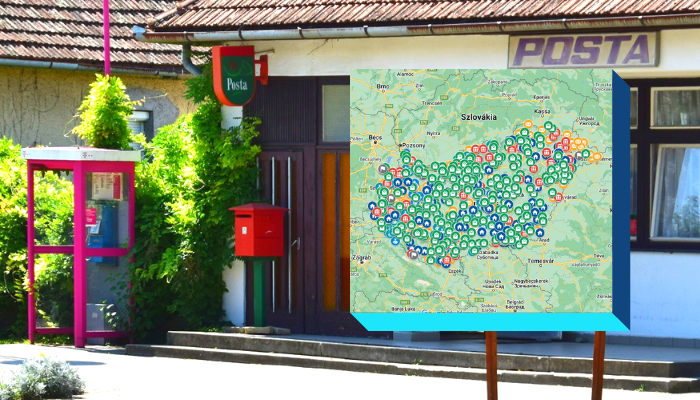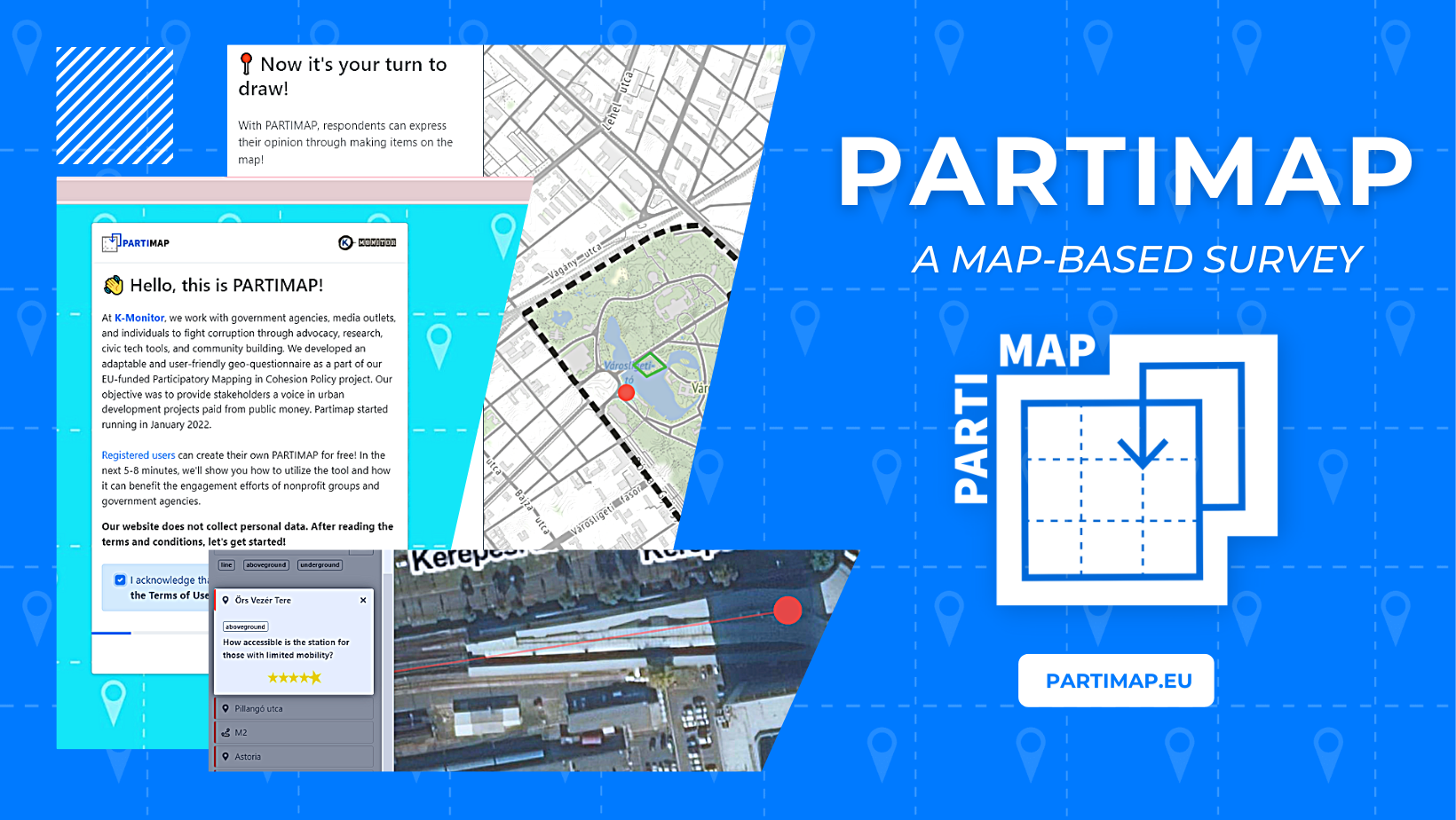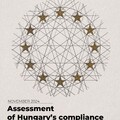After a bitterly fought election campaign overshadowed by Russia's invasion of Ukraine, the EU’s less than transparent and democratic financial conditionality mechanism took effect in Hungary. There was plenty for the corruption watchdog K-Monitor to do in 2022! In an environment where the most crucial decisions are taken behind closed doors by the national and international political elite, we spent most of our time following the government's anti-corruption reform stage play, while also trying to support local governments and citizens in their quest for democratic awareness.
We made public spending more transparent through our budget visualization website. We held a conference for participatory budgeting practitioners and activists from across the country. We improved PARTIMAP, our open source map-based survey, which is now available in English language. These activities were carried out in collaboration with the Heinrich-Böll-Stiftung Prague.

Hundreds of post offices and government offices in Hungary have been permanently closed due to the energy crisis. K-Monitor crowdsourced the closed locations and plotted them on a map.
Over the last few years, K-Monitor has worked with the Heinrich-Böll-Stiftung Prague to create a collection of resources, best practices and inspirational materials to promote transparency, accountability and public participation at the local level in Hungary. We published a study showcasing community-level solutions by municipalities, civil society and local communities to overcome the effects of the pandemic - but also, government centralization.
In 2022, for the second time, we created a 'Citizens’ budget' website to illustrate how the central budget is spent. As a unique example of illiberal 'bad governance,' on 29 December 2022 the Government issues a decree amending the 2023 budget, bypassing even the Parliament. We had to do the work again, and we did: we were the first to analyze this amendment's politically skewed priorities.
Money must be spent according to public priorities!
While democratic interest aggregation is lacking at the central level, grassroots participatory budgeting (PB) practices show the emergence of a new perspective on public budgets and the revaluation of budget literacy at the local level. Activists, experts and municipal staff gathered for our second annual PB workshop to brainstorm on more effective and engaging PB practices. This was part of a two-day event called Conspiracy for Democracy, which focused on the state of local democracy in the midst of Russia's war in Ukraine, rising energy prices and the aftermath of the pandemic.

Local governance in Central-Eastern Europe is at a crossroads. It will either lose its relevance or evolve into a pocket of democracy that actively invests in civic ecosystems to support a democratic renewal. It is especially visible in Hungary, where the Orbán government has used recentralization, budget cuts, and political pressure to exert power over the municipal sector. After the 2019 municipal elections, victorious opposition politicians promised a better inclusion of civil society in decision-making processes.
However, systemic change does not come all at once. Activists are now struggling to change the local authorities’ fixed technocratic attitude and lack of a culture of collaboration, which undermines the commitment of the newly elected leaders. Progressive cities and advocacy groups see local governance as a means to revitalize democratic political culture through greater transparency and public participation. The Covid-19 crisis presented new challenges to local authorities, both in terms of crisis management and the rapidly changing legal, political and financial environment in which they operate. In the landscape of democratic institutions and especially within the context of democratic backsliding in Hungary and Poland, local governance generally receives less attention than other elements of a democratic society, such as the judiciary or the media. As we have argued in our recent research, it is an overlooked front in the struggle for European democracy.
K-Monitor strives against corruption and promotes the transparency of public spending in Hungary. Support Us!
We discussed the challenge of promising more democracy while having less capacity to provide new public services during the workshop. While progressive cities dance with their hands and feet tied, they must cherish a different vision of how to manage public affairs. Therefore, in our workshop, we invited participants to imagine a day in the life of a Hungarian city clerk working in the city hall's participatory office in 2032, after this city has overcome its distrustful, apathetic and subservient political culture and its residents now have a real say in the matters that affect them. You can read the co-created 'diary entry' here.

For the here and now: a new tool to reclaim your neighborhood
Participatory budgeting is becoming more popular in municipalities across the country, despite the fact that the energy crisis has had a significant negative impact on community spaces and public services. During the heating season, many local libraries, post offices, and cultural facilities in less prosperous municipalities were closed. We launched a crowdsourcing campaign to collect shops, offices, and municipal facilities across Hungary that are closing due to unsustainable energy prices. We collected over 1500 locations by the end of 2022, and over 250 thousand people visited the map with the results.
For this campaign, we used PARTIMAP, a free, easy-to-use and customisable map-based survey, to collect and process the geolocations of hundreds of people. This tool was developed by K-Monitor in 2021, and we worked with the HBS Prague to expand its functionality and give it a fully functional English version.
We firmly think that citizens affected by publicly funded developments should have a say in these projects. Smart benches don't make a public square a community place, only locals, if they grow to like it. Billions of euros are being used to renovate our urban spaces, public buildings and transport facilities. But public consultation and stakeholder involvement is often reduced to a formality. Participatory mapping is a process by which the invaluable knowledge of stakeholders is incorporated into community developments designed for their benefit.
The PARTIMAP map-based survey application makes engaging with local stakeholders faster, easier and more efficient. It has already helped in the planning of several initiatives to support cyclists, including the expansion of the BUBI bike-sharing system in Budapest. We expect it to be well received and used in other countries. It is free to use after registration, has customisable design features and can also be freely developed as it is an open source platform. Feel free to contact us if you need it translated into your language or if you can help with translations. Whether you represent a public body, a municipality or a local interest group, if you're looking for a smart and transparent way to get to know the views of your community, try PARTIMAP!
These activities were made in cooperation with Heinrich-Böll-Stiftung Prague.
Címkék: english
Szólj hozzá!
A bejegyzés trackback címe:
Kommentek:
A hozzászólások a vonatkozó jogszabályok értelmében felhasználói tartalomnak minősülnek, értük a szolgáltatás technikai üzemeltetője semmilyen felelősséget nem vállal, azokat nem ellenőrzi. Kifogás esetén forduljon a blog szerkesztőjéhez. Részletek a Felhasználási feltételekben és az adatvédelmi tájékoztatóban.






